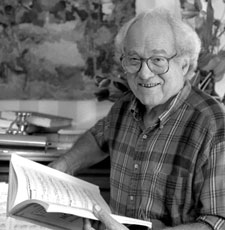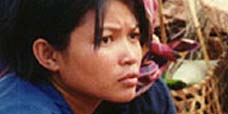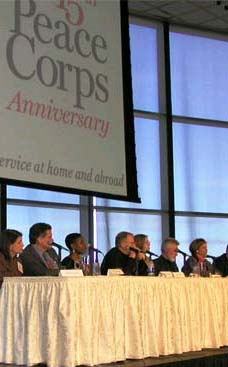
Coffin was approached by Sargent Shriver in 1961 to run the first training programs for the Peace Corps. Coffin took up the task and took a temporary leave from Yale, working to develop a rigorous training program modeled on Outward Bound and supervising the building of a training camp in Puerto Rico.
More about William Sloane Coffin
William Sloane Coffin
From Wikipedia, the free encyclopedia
Jump to: navigation, search
Rev. William Sloane Coffin, Jr. (June 1, 1924 – April 12, 2006) was a liberal Presbyterian and United Church of Christ clergyman and long-time peace activist with international stature.
He was a CIA agent, and later chaplain of Yale University, where the influence of Reinhold Niebuhr's social philosophy led him to become a leader in the civil-rights and peace movements of the 1960s and 1970s.
He went on to serve as Senior Minister at the Riverside Church in New York City, and President of SANE/Freeze (now Peace Action), the nation's largest peace and justice group, and prominently opposed United States military intervention from the Vietnam War to the Iraq War.
[edit]
Biography
[edit]
Childhood
William Sloane Coffin, Jr. was born into the wealthy elite of New York City: his paternal grandfather was co-owner of the very successful W. & J. Sloane Company, his uncle was Henry Sloane Coffin, president of Union Theological Seminary and one of the most famous ministers in the U.S., and his father, William Sloane Coffin, Sr. was president of the Metropolitan Museum of Art and an executive in the family business.
His mother, Catherine Butterfield, had grown up in the Midwest, and as a young woman spent time in France during World War I providing relief to soldiers, and met her future husband there, where he was also engaged in charitable activities. Their three children grew up fluent in French by being taught by their nanny, and attended private schools in New York.
William Sr.'s reformer father, Edmund Coffin, owned Hearth and Home Corporation (see[[1]]), a property investment and management firm that renovated and rented low-income housing in New York. Upon Edmund's death in 1928, it went to his sons William and Henry, with William managing the firm. When the Great Depression hit in 1929, William allowed tenants to stay whether or not they could pay the rent, quickly draining his own funds, and at a time when the family's substantial W. & J. Sloane stock was not paying dividends.
William Sloane Coffin, Sr. (1879-1933)
Enlarge
William Sloane Coffin, Sr. (1879-1933)
William Sloane Coffin, Sr. died at home in 1933 from a heart attack he suffered returning from work on his oldest son Edmund's eleventh birthday. After this, his mother Catherine decided to move the family to Carmel, California to make life more affordable, but was only able to do this with financial support from her brother-in-law Henry. After years spent in the most exclusive private schools in Manhattan, the three Coffin children were educated in Carmel's public schools, where William had his first sense that there was injustice — sometimes very great — in the world.
A talented musician, he became devoted to the piano and planned a career as a concert pianist. At the urging of his uncle Henry (who was still contributing to the family's finances), his mother enrolled him in Deerfield Academy in 1938.
The following year (when Edmund left for Yale University), William moved with his mother to Paris at the age of 15 to receive personal instruction and was taught by some of the best teachers of the 20th century — including Nadia Boulanger. The Coffins moved to Geneva, Switzerland when World War II came to France in 1940, and then back to the United States, where he enrolled in Phillips Academy in Andover, Massachusetts.
[edit]
Early adulthood
When he graduated from high school in 1942, he enrolled in Yale University in the school of music. While continuing his pursuit of the piano, he was also excited by the prospect of fighting to stop fascism and became very focused on joining the war effort. He applied to work as a spy with the Office of Strategic Services in 1943, but was turned down for not having sufficiently "Gallic features" to be effective. He then left school, enlisted in the Army, and was quickly tapped for becoming an officer. After training, he was assigned to work as liaison to the French and Russian armies in connection with the Army's military intelligence unit, and where he heard first-hand stories of life in Stalin's USSR.
After the war, Coffin moved to New Haven, Connecticut where his mother and brother were, and returned to Yale. Coffin had been a friend of George H. W. Bush since his youth, as they both attended Phillips Academy (1942), and he brought Coffin into the exclusive Skull and Bones secret society at the university in Coffin's senior year.
Upon graduating in 1949, Coffin entered the Union Theological Seminary, where he remained for a year, until the outbreak of the Korean War reignited his interest in fighting against communism. He joined the CIA in 1950 (his brother-in-law Frank Lindsay had been head of the OSS's Office of Policy Coordination which was one of the predecessors of the CIA) spending three years in West Germany recruiting anti-Soviet Russian refugees and training them how to undermine Stalin's regime.
He grew increasingly disillusioned with the role of the CIA and the United States due to events including the CIA's involvement in overthrowing Prime Minister Mohammed Mossadegh of Iran in 1953, followed by the CIA's orchestration of the coup that removed President Jacobo Arbenz in Guatemala in 1954.
[edit]
The ministry and political activism
After leaving the CIA, he enrolled at Yale Divinity School and earned his Bachelor of Divinity degree in 1956, the same year he was ordained a Presbyterian minister. This same year he married Eva Rubinstein, the daughter of pianist Arthur Rubinstein, and became chaplain at Williams College. Soon, he accepted the position as Chaplain of Yale University, where he remained from 1958 until 1975.
With his CIA background, he was terribly dismayed when he learned in 1964 of the history of French and U.S. involvement in South Vietnam and how it differed from what the U.S government public position was -- especially regarding broken promises to hold a referendum in the south about unification with North Vietnam. He was in early opposition to the Vietnam War and became famous for his anti-war activities and his civil rights activism. He had a prominent role in the freedom rides, challenging segregation and the oppression of black people. As chaplain at Yale in the early 1960s, Coffin organized busloads of Freedom Riders to challenge segregation laws in the South.
He was jailed many times — but his first conviction was overturned by the Supreme Court. In 1962, he joined SANE: The Committee for a SANE Nuclear Policy, an organization he would later lead.
Coffin was approached by Sargent Shriver in 1961 to run the first training programs for the Peace Corps. Coffin took up the task and took a temporary leave from Yale, working to develop a rigorous training program modeled on Outward Bound and supervising the building of a training camp in Puerto Rico.
Coffin used his pulpits as a platform for like-minded crusaders, hosting the Rev. Martin Luther King Jr., South African Archbishop Desmond Tutu and Nelson Mandela, among others. Fellow Yale graduate Garry Trudeau has immortalized Coffin as "the Rev. Sloan" in the Doonesbury comic strip. During the Vietnam War years, he and his friend Howard Zinn often spoke from the same anti-war platform. An inspiring speaker, Coffin is known for optimism and humor: "Remember, young people, even if you win the rat race, you're still a rat."
By 1967, Coffin increasingly concentrated on preaching civil disobedience and supported the young men who turned in their draft cards. That October, he raised the possibility of declaring Battell Chapel at Yale a sanctuary for resisters, or possibly as the site of a large demonstration of civil disobedience. School administration barred the use of the church as a sanctuary. Coffin later wrote, "I accused them of behaving more like true blues than true Christians. They squirmed but weren't about to change their minds.... I realized I was licked."
And so on January 5, 1968, Coffin, Dr. Benjamin Spock (the pediatrician and baby book author who was also a Phillips Academy alumnus), Marcus Raskin, Michael Ferber, and Mitchell Goodman were indicted by a Federal grand jury for "conspiracy to counsel, aid and abet draft resistance." All but Raskin were convicted that June, but in 1970 an appeals court overturned the verdict.
Coffin remained chaplain of Yale until December 1975. In 1977 he became senior minister at the Riverside Church — an interdenominational congregation affiliated with both the United Church of Christ and American Baptist Churces, and one of the most prominent congregations in New York City. He was a controversial, yet inspirational leader at Riverside. He openly and vocally supported gay rights when many liberals still were uncomfortable with homosexuality and homosexuals, and many in his congregation openly disagreed with his positions.
[edit]
Nuclear disarmament
Coffin started a strong nuclear disarmament program at Riverside, and hired Cora Weiss (a secular Jew he had worked with during the Vietnam War and had traveled with to North Vietnam in 1972 to accompany three released U.S. prisoners of war) which was uncomfortable for some parishioners. Broadening his reach to an international audience, he met with numerous world leaders and traveled abroad. His visits included going to Iran to perform Christmas services for hostages being held in the U.S. embassy during the Iran hostage crisis in 1979 and to Nicaragua to protest U.S. military intervention there.
In 1987, he resigned from Riverside Church to pursue disarmament activism full time, saying then that there was no issue more important for a man of faith. He became president of SANE/FREEZE (now Peace Action), the largest peace and justice organization in the United States. He retired with the title president emeritus in the early 1990s, and since then has taught and lectured across the United States and overseas and written a number of books. He has cautioned that we are all living in "the shadow of Doomsday," and has urged that people turn away from isolationism and become more globally aware.
[edit]
Personal life
Coffin was married three times; his first wife, and mother of his children, was Eva Rubinstein, daughter of pianist Arthur Rubinstein. The loss of their son Alexander in a car accident in 1983 inspired one of Coffin's most requested sermons. Coffin's daughter lives in California, and his son David is a musician in Boston, Massachusetts.
Although he was given only six months to live in early 2004 due to a weakened heart, Coffin lived with his third wife Randy in the small town of Strafford, Vermont, a few houses away from his brother Ned, until his death at age 81.
[edit]
Quotes by Coffin
* "In our time all it takes for evil to flourish is for a few good men to be a little wrong and have a great deal of power, and for the vast majority of their fellow citizens to remain indifferent." — In the Yale Alumni magazine in 1967
* The U.S. government should have vowed "...to see justice done, but by the force of law only, never by the law of force." — After September 11, 2001
* "We yearned for a revolution of imagination and compassion that would oppose the very aggressiveness and antagonism that characterized the actions of both Nixon and the Weathermen. We were convinced nonviolence was more revolutionary than violence" — referring to the organizers of the Moratorium to End the War in Vietnam
* "Without love violence will change the world; it will change it into a more violent one." — June 1968
* "It's too bad that one has to conceive of sports as being the only arena where risks are, [for] all of life is risk exercise. That's the only way to live more freely, and more interestingly."
* "The world is too dangerous for anything but truth and too small for anything but love."
* "What we and other nuclear powers are practicing is really nuclear apartheid. A handful of nations have arrogated to themselves the right to build, deploy, and threaten to use nuclear weapons while policing the rest of the world against their production. . . . Nuclear apartheid is utopian and arrogant. It is a recipe for proliferation, a policy of disaster."
* "Every nation makes decisions based on self-interest and defends them on the basis of morality." — to the Yale Class of 1968 35th reunion, May 2003
* "Even if you win the rat race, you're still a rat."
[edit]
Books
* Letters to a Young Doubter, Westminster John Knox Press, July 2005, ISBN 0664229298 (review and article from CommonDreams.org)
* Credo, Westminster John Knox Press, December 2003, ISBN 0664227074
* The Heart Is a Little to the Left: Essays on Public Morality, Dartmouth College, 1st edition, October 1999, ISBN 0874519586
* The Courage to Love, sermons, Harper & Row, c1982, ISBN 0060615087
* Once to Every Man: A Memoir, autobiography, Athenaeum Press, 1977, ISBN 0689108117
* William Sloane Coffin, Jr.: A Holy Impatience, by Warren Goldstein, Yale University Press, March 2004, ISBN 0300102216
* The Trial of Dr. Spock, William Sloane Coffin, Michael Ferber, Mitchell Goodman, and Marcus Raskin, by Jessica Mitford, New York, Knopf, 1969 ISBN 0394449525


















